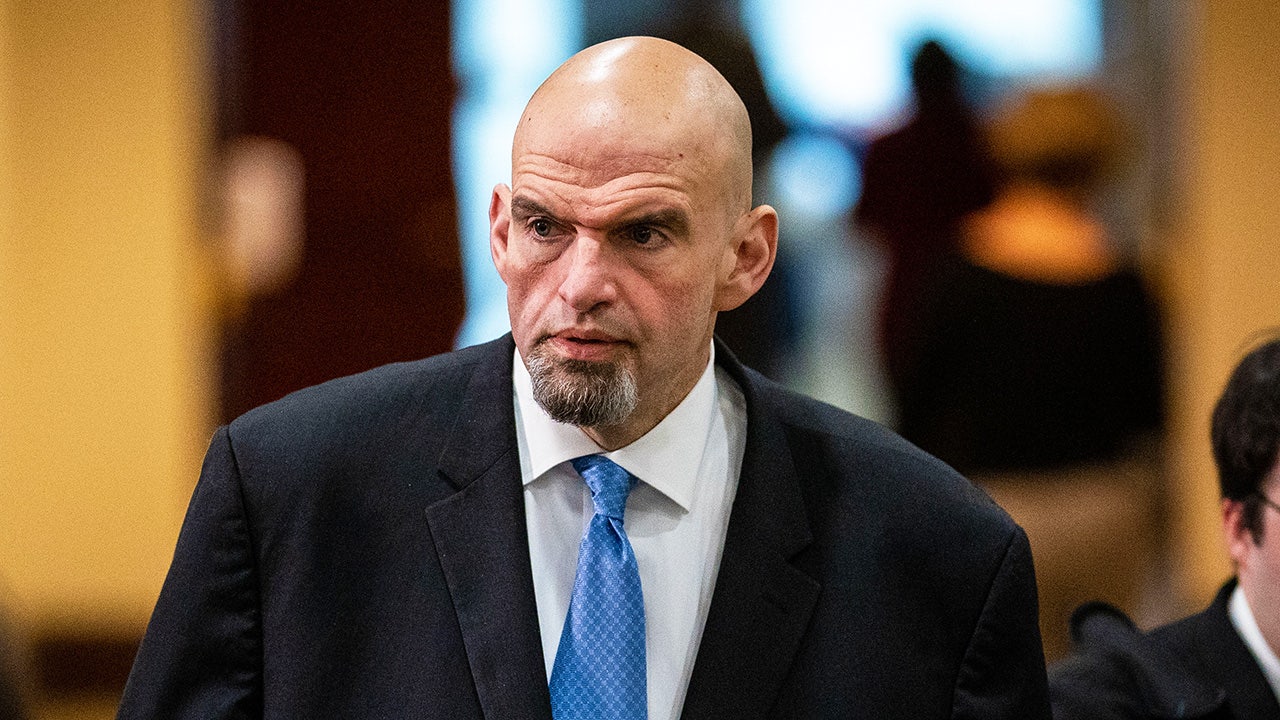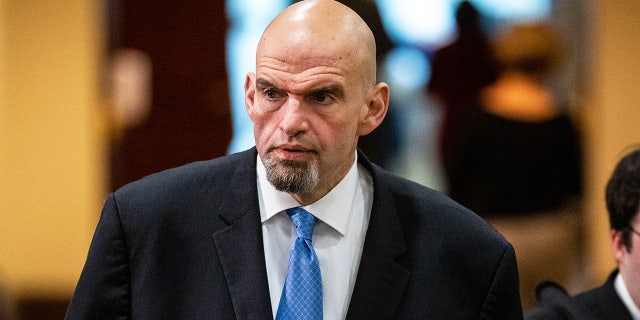Fit for duty

The message appeared on Twitter from the President of the United States.
President Biden directed the missive to the junior senator from Pennsylvania and his wife.
“John, Gisele – Jill and I are thinking about your family today,” wrote Mr. Biden. “Millions of people struggle with depression every day, often in private. Getting the care you need is brave and important. We’re grateful to you for leading by example.”
President Biden wasn’t the only one who applauded Sen. John Fetterman, D-Penn., for seeking treatment at Walter Reed Medical Center for what was termed “severe” clinical depression. Other colleagues from both sides of the aisle commended Fetterman for doing the right thing and seeking help.
“It’s very important that he’s coming out with this so that we can actually use it as a teaching moment,” said Fox contributor Dr. Marc Siegel. “His treating psychiatrist thinks (hospitalization) is necessary or beneficial.”
Health questions have swirled around Fetterman since shortly after launching his bid for the Senate.
Fetterman suffered a stroke last spring. Doctors implanted a pacemaker and defibrillator. The senator has struggled to process audio and often uses an electronic device with closed captioning to see and read speech.
But just five weeks into his term, Fetterman felt lightheaded and went to the hospital. After tests, doctors ruled out a second stroke, and he returned to the Senate.
However, a few days later, Fetterman was gone again. He missed an Agriculture Committee hearing and three roll call votes in the Senate. Because of his absences, Fetterman has missed a third of all votes cast in the Senate this year. After the Senate adjourned for the week, Fetterman’s office announced the senator was back in the hospital after consulting with Capitol Attending Physician Brian Monahan.
Fetterman’s second hospitalization – just six weeks into his six-year Senate term – sparks questions about if he’s up to the job and if ill lawmakers can and should serve.

Sen. John Fetterman (D-PA) departs a closed-door, classified briefing for Senators at the U.S. Capitol on Tuesday, Feb. 14, 2023 in Washington, DC. (Kent Nishimura / Los Angeles Times via Getty Images)
Senate colleagues were already concerned about the freshman.
“I’ve gotten to know John pretty good. And I stood beside him on his first vote,” said Sen. Tommy Tuberville, R-Ala., before Fetterman returned to the hospital. “You can tell he’s struggling a little but. But he says he’s getting better.”
Tuberville noted that Fetterman was “having a tough time.”
“I’m with him at luncheons and committee meetings and he’s doing just fine,” said
Senate Majority Whip Dick Durbin, D-Ill.
FLASHBACK: FETTERMAN’S SERIOUS HEALTH ISSUES WERE DOWNPLAYED IN THE MEDIA FOR MONTHS
When asked if Fetterman would be present for big votes, the Whip replied “Of course. No question.”
Health issues surrounding senators are legion. And when a senator falls ill, the clubby Senate customarily closes ranks around members.
“They treat each other the way they want to be treated,” said former Senate Historian Don Ritchie. “There is a great sense of there but for the grace of God, go I. And so senators are very tolerant of their colleagues and go out of their way to accommodate them.”
Ritchie referred to this as an extension of what is known as “Senatorial courtesy.”
Medical professionals cautioned against stigmatizing Fetterman’s condition. However, there is a caveat when it comes to the health concerns of a new U.S. senator, not even two months into his a six-year term.
“This is a challenge to the American public to be able to feel for someone to wish them well. To root them on. But also be aware of what the limitations might be,” said Siegel. “Will he reach a level of proficiency that we would require as a minimum for a senator? It’s actually hard for anybody to be in a position to judge that.”

The east side of the US Capitol in the early morning. Senate Chamber in the foreground. (iStock)
About 30 percent all stroke victims suffer from depression.
There are questions about Fetterman being up to the rigors of the U.S. Senate.
“He’s been in the hospital twice now in two weeks,” said Siegel. “These are very, very relevant concerns. And the American public, and especially the voters of Pennsylvania, should be concerned.”
The stories of lawmakers’ debilitating health issues and their fitness to serve are nearly as old as the republic.
POLITICS IS THE ART OF WHAT’S POSSIBLE. FOR THE HOUSE GOP, THAT MEANS TARGETING CRIME-RIDDLED DC
“This is a long subject,” said Ritchie when I first phoned him to request an interview about the historical precedent of senators and health problems keeping them away from the Senate for prolonged periods.
President Biden missed six months as a senator from Delaware in 1988 after two brain aneurysms and a craniotomy. The President first fell ill in February of that year. He partially recovered by spring. But not fully up to the full Senate workload until August.
Former Sen. Mark Kirk, R-Ill., missed more than a year after his stroke. Kirk struggled to walk. However, Kirk triumphantly returned to Capitol Hill, climbing the steps of the Senate with an assist from Sen. Joe Manchin, D-W.V.
Former Sen. Tim Johnson, D-S.D., also missed significant time after a major stroke which forced him to navigate the Congressional corridors with a scooter.
Sens. Ben Ray Luhan, D-N.M., and Chris Van Hollen, D-Md., missed smaller chunks of time after suffering strokes themselves in recent years.
But other cases stand out.

The late South Carolina Senator Strom Thurmand served to be 100 years old. (Getty Images)
There were health concerns for decades about late Sen. Strom Thurmond, R-S.C., who served to be 100.
Late Senate Majority Leader Robert Byrd, D-W.V., also grew infirm and missed time, suffering from Parkinson’s disease.
“They weren’t anywhere near their their capability in their prime,” said Ritchie of Thurmond and Byrd. “But they were just determined they were going to carry out their offices.”
Late Sen. Thad Cochran, R-Miss., grew increasingly frail and appeared disoriented in his final years in the Senate. On one ignominious episode on the floor, Cochran voted nay despite Republicans urging a yea vote. An aide kept nudging Cochran to switch his vote the other way before the senator finally relented.
BIDEN TO DRAW HEALTH CARE CONTRAST WITH GOP IN VIRGINIA
There were also questions about the health of late Sen. Jim Jeffords, I-Vt., – punctuated by one episode toward the end of Jeffords’ Senate career. A confused Jeffords showed up near the House chamber to vote. Jeffords was a former House member. But had not served in the House for 17 years at that point.
“We had a senator once who had been a prisoner of war during the Vietnam War and when other senators would ask witnesses questions at hearings, he would sometimes answer them,” said Ritchie.
Late Sen. Clair Engle, D-Calif., cast the tie-breaking vote to crush a filibuster of the Civil Rights Act in 1964. A brain tumor partially paralyzed Engle and inhibited his speech.
“They actually wheeled him into the chamber,” said Ritchie of Engle. “He couldn’t speak any more. But he pointed to his eye and the presiding officer took that as an ‘aye’ vote. He died just a few weeks later.”
There’s no “fitness” clause for someone to serve in the Senate. Article I, Section 3 of the Constitution sets the bare minimum: At least 30 years of age, a U.S. citizen for nine years and “when elected, be an inhabitant of that State for which he shall be chosen.
This is why the push by former South Carolina Gov. Nikki Haley (R) for a competency test for those 75 years of age may be unconstitutional.
There are no “recall elections” for U.S. senators. The governor cannot just declare the seat vacant. Once a lawmaker is in, they are in.

U.S. President Joe Biden stops to speak to reporters as he walks to Marine One on the South Lawn of the White House February 24, 2023 in Washington, DC. Biden is spending the weekend at his home in Delaware. (Drew Angerer/Getty Images)
Congress does not expel lawmakers for ill health. And even that effort would require a two-thirds vote. The Senate has only expelled 15 senators in the history of the republic. Most of those expulsions came around the time of the Civil War.
“Expulsion is really reserved for people who have committed crimes or had committed treason. It’s not for old age,” said Ritchie.
In 1942, late Sen. Carter Glass, D-Va., fell ill with cancer. Glass chaired the Senate Appropriations Committee. He never returned to the Senate before dying in 1946. Glass even refused to take calls from the governor, begging him to resign.
“Our entire system of government has been remiss of not addressing fitness before,” said Siegel. “We’ve had many examples of senators who were still in office but were compromised.”
There is also a history candidates and public officials covering up or minimizing the severity of their health issues.
When Fetterman first fell ill last year, it was another two days before his campaign said he suffered a stroke. His wife later described the problem as “a little hiccup.” But later Fetterman said he “almost died.”
President Ronald Reagan came dangerously close to dying after he was shot in 1981. The press was complicit with the White House in the 1930s and 1940s as President Franklin Delano Roosevelt was paralyzed from the waist down. Official Washington concealed this fact from the public.
President Dwight Eisenhower suffered a heart attack.
President Woodrow Wilson suffered multiple strokes – the most serious in 1919. The White House’s doctor discouraged public notification of just how sick Wilson was.
CLICK HERE TO GET THE FOX NEWS APP
There’s not a really good way to handle this for public officials. The voters have the right to know about the health of their policymakers. And not all illnesses or incapacitations disqualify those from serving.
This is why it’s such a challenging debate. It probably underscores why elected officials are sometimes reluctant to inform the public about their maladies. But frankly some lawmakers may not know themselves if they should continue or call it quits.
Share this news on your Fb,Twitter and Whatsapp
Times News Network:Latest News Headlines
Times News Network||Health||New York||USA News||Technology||World News